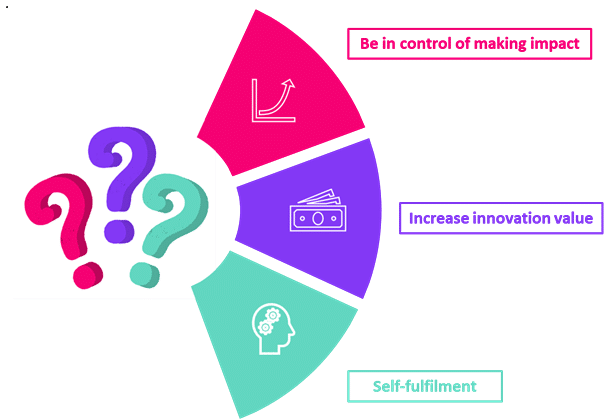Academic spin-offs are important drivers of knowledge valorisation from academic institutions. By looking at the Dutch medical biotech academic spin-off sector, we identified three reasons for starting a spin-off.
With Intellectual Property (IP) created, and therefore owned by the university, these types of companies are important for further IP exploitation, creating economic development and facilitating job growth. The Dutch start-up ecosystem has a big growth potential with an estimated possible value creation of €400B and 250.000 new jobs up until 2030[1]. To date, a total of 745 academic spin-offs have been established in the Netherlands, 80% of which are still active (although the majority of companies are very small, <10 employees)¹. But why, as an academic researcher, would you start a company based on your research results or invention?
1. Be in control of making impact
Innovation development through a spin-off is a way to stay in control and influence the impact it could potentially make. Many inventions do not reach the market. One reason for this is that academic IP is too far developed or too expensive for the academic institution to further explore, while being too early in development for (pharmaceutical) companies to acquire or in-license (see the quote below from one of our spin-off interviewees). These factors could result in the invention being shelved.
Because it’s very often the ideas that come out of and the patent that comes out of an academic research group are too early stage, are too preliminary with respect to all the proof of concepts, so generally pharma companies do not want to in licence it.
A spin-off is key in bridging the development gap between fundamental research and commercial development. For a start-up company, new funding options are available. These include for example, Venture Capital firm investments, Angel investments, or funds from governments and the European Commission (e.g., EIT, EIC Transition or Accelerator grant schemes). These provide support for validation, investor-readiness, clinical research, go2market and/or scale-up activities.
2. Increase the innovation value
By pursuing the innovation opportunity through a spin-off towards investor readiness and beyond, the value of the innovation and company increases. This could potentially result in more lucrative acquisition or licensing deals. As mentioned, academic IP and patents filed by academic institutions in the medical biotech sector are usually not interesting enough for a pharmaceutical company to acquire or in-license. Also, a medical biotech spin-off company will not likely bring a drug product to the market itself (although there are exceptions), as these costs are immensely high (>€100M). To illustrate, when a spin-off further develops the innovation, the development costs rise, but the deals will also get more lucrative, in case of good (pre-)clinical results. In 2023, the median upfront cash and equity payments from big pharma were up to $100 million for Phase II programs for deals signed since 2022, a 37% increase over Phase I licenses ($73M median). Median upfront payments for preclinical/IND stage programs were $60M and $42M for platform/discovery programs, demonstrating the increase in deal value corresponding to more advanced development stages[2]. Furthermore, the top upfront payment in the first half of 2023 was $136M for preclinical stage drug compared to $245M for Phase I program[3]. However, risks are also higher with increased investment of capital and effort with a big chance of failure still remaining[4].
3. Eagerness to develop the innovation by yourself
You, as the academic researcher, have put a lot of research efforts, time, and dedication in the innovation with commercial potential. Logically, you might want to pursue the opportunity yourself and take an active role in the to-be-established spin-off. What is important to consider in this case, is that a committed team is considered a critical factor in spin-off success (to e.g., obtain financing). Therefore, it is important to assign at least one person that takes this committed role, which could be yourself as a (finished) PhD candidate or Post Doc researcher, or someone else that you trust for this process. Maintain a good relationship with the academic research group and ideally let the professor take an advisory or CSO role in the company, providing the necessary scientific expertise. Lastly, it is critical to secure additional business expertise early (e.g., someone to take the CEO role), building a strong and diverse team to ensure success.
“Starting a spin-off company allows you, as an academic researcher, to stay in control of making impact. It also increases the value of your innovation and your own level of self-fulfilment.”
FLOORTJE VAN RONGEN, MSC –
CONSULTANT AT TTOPSTART
[1] https://hollandhightech.nl/_asset/_public/Nieuws-en-Agenda/Nieuws/2023/TCHL-SoDT-report-2023-DIGITAL-USE-SPREADS.pdf
[2] https://www.jpmorgan.com/content/dam/jpm/commercial-banking/insights/life-sciences/jpmorgan-q2-2023-biopharma-licensing-and-venture-report.pdf
[3] https://www.stifel.com/Newsletters/InvestmentBanking/BAL/Marketing/Healthcare/Biopharma_TimOpler/Stifel_FirstHalfBiopharmaMarketReview_07.07.2023.pdf
[4] https://www2.deloitte.com/content/dam/Deloitte/uk/Documents/life-sciences-health-care/deloitte-uk-pharma-licensing.pdf
Get in touch!
Are you thinking about launching a spin-off company based on your research results or did you already start one and are looking for support in making your spin-off investor-ready? At ttopstart, we speak both the language of the academic researcher and entrepreneur and are eager to support you in making impact. Get in touch with us by filling out the form below!
Would you like to know how to make your spin-off journey a success? Read the article here.

